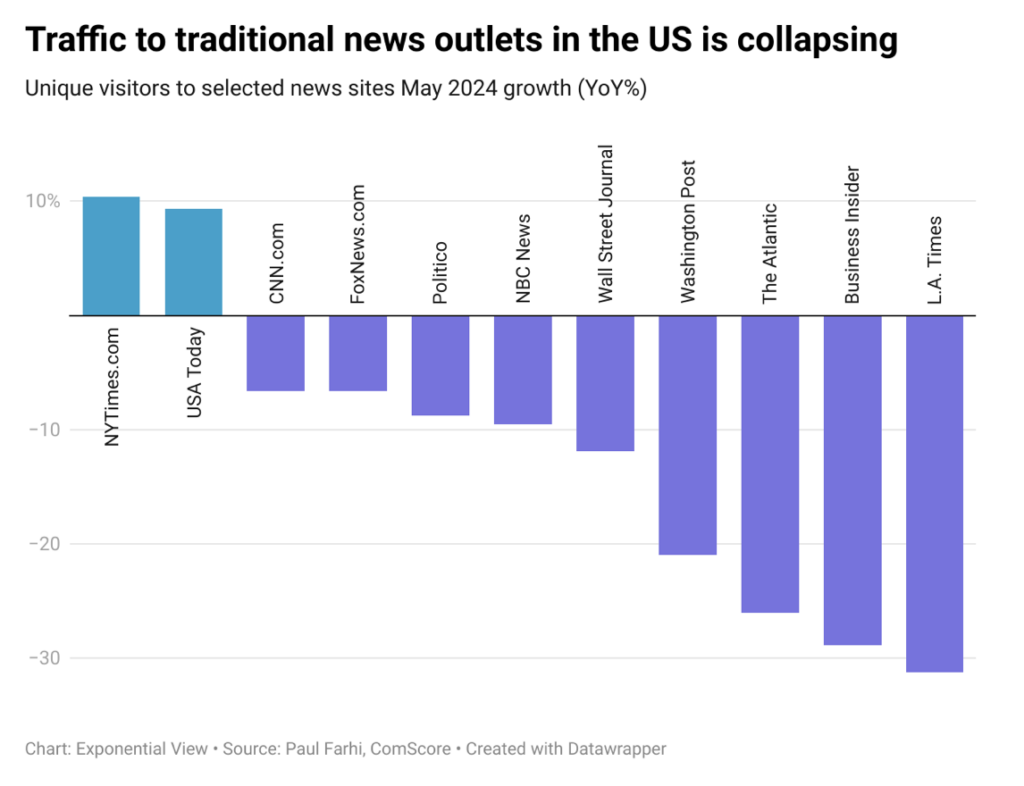Brief encounter

Quote of the Day
“We look at the present through a rear view mirror. We march backwards into the future.”
- Marshall McLuhan
Musical alternative to the morning’s radio news
Bach | Wachet auf from Cantata No 140 | Sonny Landreth
I love this Cantata (who doesn’t?), but I’ve never heard it played like this before.
Long Read of the Day
AI as Self-Erasure
A really thoughtful (and thought-provoking) essay by Matthew Crawford in The Hedgehog Review.
I was at a small dinner a few weeks ago in Grand Rapids, Michigan. Seated next to me was a man who related that his daughter had just gotten married. As the day approached, he had wanted to say some words at the reception, as is fitting for the father of the bride. It can be hard to come up with the right words for such an occasion, and he wanted to make a good showing. He said he gave a few prompts to ChatGPT, facts about her life, and sure enough it came back with a pretty good wedding toast. Maybe better than what he would have written. But in the end, he didn’t use it, and composed his own. This strikes me as telling, and the intuition that stopped him from deferring to AI is worth bringing to the surface.
To use the machine-generated speech would have been to absent himself from this significant moment in the life of his daughter, and in his own life. It would have been to not show up for her wedding, in some sense. I am reminded of a passage in Tocqueville where he noticed that America seemed to be on a trajectory that would have it erecting “an immense tutelary power” that wants only what is best for us, and is keen to “save us the trouble of living.”
LLMs, Crawford argues (perceptively, IMHO), won’t return us to a pre-linguistic state, but they do point to a post-human one. This is because words have significance for us, but they don’t have for a machine (or a parrot for that matter).
Do read on. I was often reminded as I read it of my feeling that the subliminal thrust of this technology is what Brett Frischman and Evan Selinger described in their perceptive book as the re-engineering of humanity in order to make it more amenable to the needs of machines.
I was also reminded of an observation what I used to attribute — wrongly — to Martin Heidegger, but which in fact came from Max Frisch in his book Homo Faber:
“Technology is the art of so arranging the world that we don’t have to experience it.”
Thanks to Kevin Cryan for alerting me to Crawford’s essay.
Chart of the Day

From Azeem Azhar’s newsletter.
Traffic to traditional news outlets in the US is collapsing and it’s not just them – only 22% of people globally now rely on publisher websites as their main source of news, down 10 percentage points since 2018. The long-awaited platform shift is happening, but to what? The picture isn’t clear. Social and video platforms are on the rise, but the landscape is fragmented. The gatekeepers of control have also changed. Where media moguls like Rupert Murdoch once controlled content, now it’s a mishmash of tech platforms, in a more dislocated ecosystem than we’ve seen in the past decade.
These platforms, which prioritise engaging content, have led to the rise of news influencers. 66% of people worldwide watch short news videos on a weekly basis. At the same time, news avoidance is at an all-time high.
The focus on the individual has mixed effects. The journalistic model isn’t necessarily dead, it’s changing.
Yep. But to what?
My commonplace booklet
Every year the highlight of our Summer is a slow drive down through La France Profonde until we reach Provence: small roads, rural villages, small hotels. This year we noticed something unusual: at the entrance to many rural villages the village sign had been neatly turned upside down. The care with which the operation had been carried out meant that vandalism could be ruled out as an explanation. So eventually I resorted to search engines, and found this useful BBC report, which explained all.
The name-bearing roadside plaques have been unscrewed, flipped, then meticulously screwed back on.
It’s a campaign by farmers to draw attention to what they say is their increasingly precarious way of life.
Starting with a protest in the southern Tarn department in November, it has now spread all over the country.
”We were trying to think of a way of denouncing all the contradictory instructions we keep getting,” said Philippe Bardy, head of the FNSEA farmers’ union in the Tarn.
”Where we come from, if someone tells us to do one thing one day and then the opposite the next, we say we’re walking on our heads. That’s where the idea came from.”
Farmers cite specific grievances such as the increasing cost of farm diesel, late payment of EU subsidies, burgeoning bureaucracy and competition from imports.
But Philippe Bardy adds: “There is no other profession that suffers such a mental load.
”On one side, the minister asks us to change our practices, to make them more ecological. On the other, he tells us to produce as much as possible so France can achieve food sovereignty…
Linkblog
Something I noticed, while drinking from the Internet firehose.
- From Quartz Daily Brief
”People who live in the U.S. are just too swamped to take a holiday — or so they say.
Despite only receiving an average of 12 vacation days a year, more than half of Americans said they didn’t use all of their vacation time last year. The top reason? “Life is too busy to plan or go on vacation.”
Twelve paid holiday days a year! I had a friend who was a talented but underpaid researcher in Cambridge. He had a growing family (4 energetic boys) and needed to earn more, so he went to work for a big pharmaceutical company in the U.S. where he rose quickly to become a VP for R&D. Despite that seniority, he had only 14 days holiday allowance, and told me that on the first of these fortnight-long breaks his American colleagues were pissed off that he never once opened his laptop.
(In the end he decided he’d be better working for a big pharma outfit in Switzerland, where they take proper holidays.)
This Blog is also available as an email three days a week. If you think that might suit you better, why not subscribe? One email on Mondays, Wednesdays and Fridays delivered to your inbox at 6am UK time. It’s free, and you can always unsubscribe if you conclude your inbox is full enough already!
